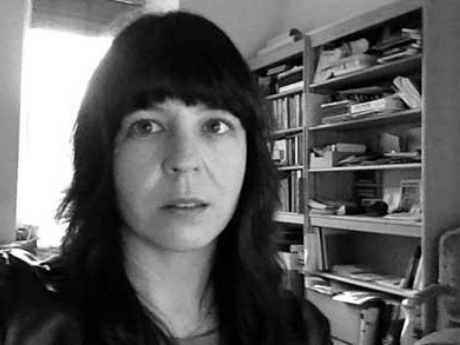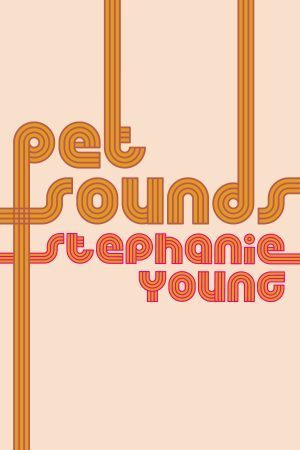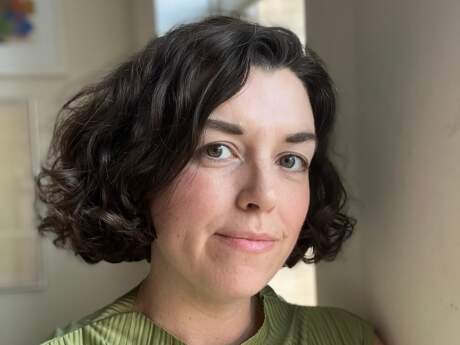In Their Own Words
Stephanie Young on “Ave | Via”

AVE | VIA
with reverence
or from the old Norse, kept in check
frightened, restrained, disciplined, fit: ave
a formal expression of greeting
birds, small birds
water birds, song birds, wading birds
of paradise, of passage, of prey—
ave migratoria
to be or fare well
now and in the hour of our death
90th Ave, beautifully remodeled
55th Ave, a bungalow ready for your move-in
23rd Ave, built as an ammunition box factory during WWII
the trees that lined them then
the pre-wood trees
in pre-dawn light
I woke in wonder
in night sweats
within a forest dark
within 30 days
on every side a hospital
a hospital complex
the transit village
this our mortal life
more than 600 workers hidden from view
water flowing underground
the RCA TV repair shop
the hot mess house
vanished in a maze
I reawoke to find myself
upon the course of this
upon the road
in the middle of the war against nurses and patient care
halfway along the road we have to go, three cranes
I found that I had strayed into The Forest, an American horror
film, The Forest, a survival video game, The Forest, a plantation
I woke in wonder in literature sunless and dusky—an 1871 play,
a 1903 novel—The Forest
I was eating a bagel, hand-rolled
boiled in honey water, baked in a wood fired oven
Montreal-style
either that
or I was eating an oyster
all along the wall
a ladder
I found myself again
climbing
through a night-dark wood, wellbutrin
there were no good choices
and they wouldn't answer my email
I came onto myself
when halfway through
for I did not have a child
for I had moved in a leisurely, casual, or aimless way
confused and with the middle class at strife
wherein men's salaries continue to grow until age 48
reaching $95,000 per year on average
wherein your family obtains coverage under an individual policy
where, in Jackson county, do they rent to felons
same as it ever was, same as it ever was, same as it ever was
within a shadowed forest
that men pursue
the course of this
our life
so drear
close to the heart of many cafes and shops
153,000 women aged 50 to 64 out of work
letting the days go by
in a park-like setting of trees, gardens, greenbelts, and ponds
where not a vestige of the uncultivated area legally set aside
for hunting by feudal nobility shewed
for the hard fibrous structural tissue was lost,
stems and roots
for a new job get resume and career tips
for a graph of sea level changes
water jets, seaweed wraps, mud baths, and sea-fog inhalation
appeared not anywhere
for I had lost the path
when I lost the straight and narrow waist
when halfway through I found I had vanished
I had been lost to view
alone in a dark wood?
cut your hair
for I had wandered when I had cramps, migraine, bloat,
breast tenderness, mood swings, foggy thinking, losing height
bears, seals, old men, deer, young women, raccoons—wandered
into town through automatic doors, up to the student housing
area dripping blood
way off course
way upon
the precipice of this economy
the dark woods wherein a person cries out
I awoke between two families
or subdivisional hierarchies of the same family
I found myself between a browser and a search engine
a CV and a resume
between a facebook page and a facebook group
a large phone and a tablet
pathway financial management and pathway capital partners
the rightful owner and rightful speech
a recession and a depression
the speedup, the slowdown
Clove and Hoof
Hog's Apothecary
your landlord, or anyone acting for your landlord
in tangled ways
I came to in the neighborhood
coveted for its central location, cultural diversity, great climate
the many storied properties have good bones—the breath of new
life flows through—
two spacious areas, original wood floors
updated Jack and Jill bathroom, walk-in closet
for I had—I knew that I had
dark wood
and never painted over
I'd tear it off
before I let the owner have it
for I knew I had
myself bewildered
the path direct, had failed to keep it
and the people I loved in the woods
where are they now?
where in the United States can you live off the federal
minimum wage of $7.25 an hour?
what was it I even wanted
in the woods, from them—
a little house?
and a great forest, what is that
a prairie, or a swamp
after the money's gone
wholly lost and gone
since missed the right way
into the blue again
I do not even like that song
From Pet Sounds (Nightboat Books, 2019). All rights reserved. Reprinted courtesy of the author.
On "Ave | Via"
The first version of "Ave | Via" included an epigraph from Jenny Holzer and a lot of sentences. The sentences were about foreclosure, development, student debt, and adjunct labor. About feeling unable to write poetry; about living in a neighborhood I could no longer afford. And yet I did live there, had for a long time, even as rent rose around us like water. I felt like a zombie. I felt like the epigraph I later removed, a line from poet Wislawa Szymborska as projected by Holzer: So you're here? Still dizzy from another dodge? Close shave, reprieve? One hole in the net and you slipped through? I wrote about turning, in a kind of despair, towards Caroline Bergvall's poem "Via," constructed from the first three lines of Dante's Inferno as translated into English forty-seven times by forty-seven different translators.
Which is to say that "Ave | Via" is the absolute opposite of Athena emerging fully formed from the head of Zeus, it's more like going back into his head (already split open by someone else) in order to retrieve something you forgot, or forgot how to do, so that you can think about uneven forms of life in the neighborhood. A little bit diving into the wreck, a little bit Orpheus. I love the sound of Bergvall's poem, the circular condition of waking up again and again lost, and listened to her reading it on repeat. At some point I typed up "Via" and dumped the language into a spreadsheet, a familiar form of self soothing. Then sorted it alphabetically. I was looking for patterns which were of course all around me, old, and violent.
Writing this poem brought me back to music again, as halting and rough as it felt. And then music became central to Pet Sounds, the long poem that followed, eventually forming a book this poem is part of. So too the refrain: what is it we even wanted in the woods / a little house?



